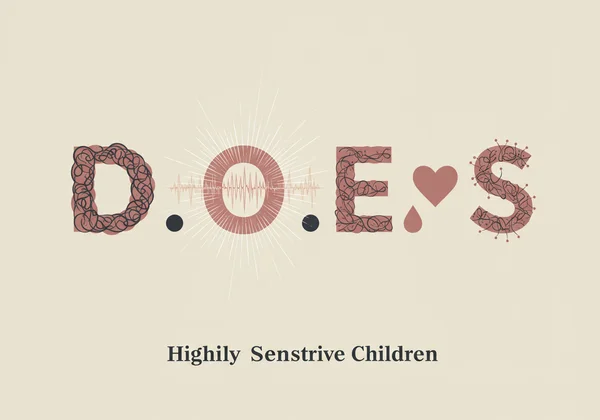Membesarkan Anak Sangat Sensitif: Panduan Memupuk Ciri-Ciri HSC
August 10, 2025 | By Eleanor Reed
Adakah anda seorang ibu bapa yang perasan anak anda memberi tindak balas lebih kuat terhadap bunyi, cahaya, atau emosi berbanding rakan sebaya mereka? Adakah mereka kelihatan merasai sesuatu lebih mendalam, mudah terbeban di tempat yang sibuk, atau mempunyai dunia dalaman yang kaya dan kompleks? Anda mungkin membesarkan anak yang sangat sensitif (HSC). Panduan komprehensif ini ada di sini untuk membantu anda memahami ciri semula jadi yang unik ini, mengenal pasti tanda-tandanya, dan melengkapkan anda dengan strategi yang penuh kasih sayang untuk membantu HSC anda berkembang maju. Menjawab persoalan, apakah tanda-tanda orang yang sangat sensitif?, adalah langkah pertama ke arah memupuk bakat luar biasa mereka.
Memahami temperamen anak anda adalah tindakan kasih sayang yang mendalam. Ia membolehkan anda beralih daripada mengurus tingkah laku sukar kepada memupuk kekuatan semula jadi mereka. Perjalanan penemuan ini boleh mengubah keibubapaan anda dan membantu anak anda membina kehidupan yang penuh keyakinan dan kepuasan. Jika anda bersedia untuk meneroka perkara ini dengan lebih lanjut, tempat yang baik untuk bermula adalah dengan alat penilaian yang boleh dipercayai.

Memahami Anak Sangat Sensitif Anda: Mengenal Pasti Ciri-Ciri Utama
Pertama sekali, adalah penting untuk memahami bahawa sensitiviti tinggi, juga dikenali sebagai Sensitiviti Pemprosesan Deria (SPS), bukanlah satu gangguan atau kecacatan. Ia adalah ciri personaliti neutral, semula jadi yang dikenal pasti dan dikaji secara meluas oleh ahli psikologi Dr. Elaine N. Aron. Dianggarkan bahawa 15-20% populasi mempunyai ciri ini, bermakna ia adalah variasi normal dalam temperamen manusia. Sistem saraf HSC sememangnya dibina untuk memproses rangsangan fizikal, emosi, dan sosial dengan lebih mendalam.
Mengenali Tanda-Tanda: Apakah Ciri-Ciri Kanak-Kanak Sensitif?
Walaupun setiap kanak-kanak adalah unik, HSC sering berkongsi sekumpulan ciri. Dr. Aron menggunakan akronim D.O.E.S. untuk menerangkan empat aspek teras:
-
D - Kedalaman Pemprosesan (Depth of Processing): HSC berfikir secara mendalam tentang pengalaman mereka. Mereka mungkin bertanya soalan mendalam, mempunyai deria jenaka yang bijaksana, dan mengambil masa lebih lama untuk membuat keputusan kerana mereka menimbang semua kemungkinan.
-
O - Terlalu Rangsangan (Overstimulation): Kerana mereka memproses segala-galanya dengan begitu teliti, mereka lebih terdedah kepada rangsangan berlebihan. Kelas yang sibuk, parti hari jadi yang bising, atau hari yang dipenuhi aktiviti boleh dengan mudah membebankan mereka, menyebabkan mereka ledakan emosi atau perlu menarik diri.
-
E - Responsif Emosi & Empati (Emotional Responsiveness & Empathy): Kanak-kanak yang sangat sensitif merasai emosi, baik positif mahupun negatif, dengan sangat kuat. Mereka sering sangat empati, mampu merasakan perasaan orang lain (termasuk ibu bapa dan haiwan peliharaan) dan sangat tersentuh oleh keindahan, muzik, atau cerita.
-
S - Sensitif kepada Halus (Sensitive to Subtleties): Mereka perasan perkara kecil yang orang lain terlepas—bau yang samar, perubahan dalam pencahayaan bilik, atau perubahan halus dalam nada suara seseorang. Ini juga menjadikan mereka sensitif kepada label pakaian yang menggaru, tekstur makanan tertentu, atau bunyi yang kuat dan tiba-tiba.

Adakah Kanak-Kanak Sangat Sensitif Tergolong Dalam Neurodivergen? Memperjelaskan Soalan Lazim.
Ini adalah persoalan lazim dan penting untuk ibu bapa. Walaupun sensitiviti tinggi melibatkan pemprosesan maklumat deria secara berbeza, ia tidak sama dengan menjadi neurodivergen dalam konteks keadaan seperti Gangguan Spektrum Autisme (ASD) atau ADHD. HSP dianggap sebagai ciri personaliti. Mungkin terdapat pertindihan gejala, seperti sensitiviti deria, tetapi neurologi asas dan ciri teras adalah berbeza. Untuk pemahaman yang lebih jelas, ujian HSP untuk kanak-kanak yang khusus boleh memberikan pandangan yang terperinci.
Apa yang Menyebabkan Kanak-Kanak Menjadi Sangat Sensitif? Meneroka Asal Usul.
Sensitiviti tinggi dipercayai sangat bergantung kepada genetik. Ia adalah ciri semula jadi yang anda bawa sejak lahir, bukan sesuatu yang disebabkan oleh keibubapaan atau persekitaran. Penyelidikan menunjukkan bahawa ia adalah strategi kelangsungan hidup yang terdapat dalam lebih 100 spesies. Individu yang lebih pemerhati dan berhati-hati dalam kumpulan boleh mengenal pasti peluang dan bahaya yang orang lain mungkin terlepas, memberi manfaat kepada keseluruhan kumpulan. Menyedari asas biologi ini dapat membantu ibu bapa melihat sensitiviti sebagai kelebihan evolusi.
Strategi Keibubapaan Berkesan untuk Kesejahteraan HSC Anda
Keibubapaan kanak-kanak sensitif bukanlah tentang mengubah siapa anak anda, tetapi tentang mencipta persekitaran di mana sifat semula jadi mereka boleh berkembang. Ia tentang bekerja dengan temperamen mereka, bukan menentangnya. Pemahaman dan penerimaan anda adalah alat yang paling berkuasa yang anda miliki.
Mencipta Persekitaran Rumah yang Tenang & Menyokong
Rumah anda sepatutnya menjadi tempat perlindungan di mana HSC anda boleh berehat daripada dunia luar yang sering membebankan. Cipta "sudut yang selesa" atau "tenda bertenang" dengan selimut lembut, bantal, dan aktiviti senyap yang boleh dilawati anak anda apabila mereka berasa terlalu terangsang. Mengekalkan rutin yang boleh diramal juga amat menenangkan bagi HSC, kerana ia mengurangkan bilangan rangsangan baharu yang perlu mereka proses.

Membangunkan Kecerdasan Emosi dan Kemahiran Menangani
Kerana HSC merasai begitu mendalam, mereka memerlukan bantuan untuk belajar mengurus emosi mereka yang kuat. Daripada mengatakan "kamu terlalu bertindak balas," sahkan perasaan mereka: "Saya nampak bunyi bising itu sangat menakutkan kamu." Bantu mereka menamakan emosi mereka untuk membina perbendaharaan kata emosi mereka. Ini mengajar mereka bahawa perasaan mereka adalah normal dan boleh diurus, satu bahagian penting dalam membangunkan kemahiran menangani yang kuat.
Adakah Kanak-Kanak Sangat Sensitif Cerdas? Memanfaatkan Kekuatan Mereka.
Tentu sekali. Walaupun sensitiviti bukanlah ukuran langsung IQ, ciri-ciri D.O.E.S. sering berkorelasi dengan kekuatan yang luar biasa. Pemprosesan mendalam mereka membawa kepada kreativiti, pandangan, dan ketelitian. Empati mereka menjadikan mereka rakan yang penyayang dan prihatin. Mereka sering sangat intuitif, teliti, dan menghargai keindahan. Raikan hadiah-hadiah ini dan bantu anak anda melihatnya sebagai kuasa super sebenar mereka.
Menangani Cabaran & Memupuk Ketahanan dalam Kanak-Kanak Sensitif
Untuk menyokong anak sensitif anda dengan berkesan, anda mesti menjangkakan cabaran dan melengkapkan mereka dengan kemahiran ketahanan. Ini memperkasakan mereka untuk menavigasi dunia yang tidak selalu direka untuk sifat sensitif mereka.
Mengurus Rangsangan Berlebihan dan Beban Deria
Pencegahan adalah kunci. Sebelum pergi ke acara yang berpotensi membebankan, berbincang dengan anak anda tentang apa yang perlu dijangkakan. Rancang untuk masa rehat selepas itu. Semasa di acara tersebut, perhatikan tanda-tanda awal bebanan, seperti menguap, menggosok mata, atau menjadi mudah marah. Sediakan strategi keluar atau tempat senyap yang boleh anda tuju untuk berehat. Pendekatan proaktif ini boleh mencegah banyak ledakan emosi.
Menyokong Kawal Selia Emosi & Ledakan Emosi
Ledakan emosi bagi HSC sering merupakan tanda bahawa sistem saraf mereka telah terlampau terbeban akibat rangsangan berlebihan. Ia bukanlah tantrum manipulatif. Semasa ledakan emosi, kekal tenang dan hadir. Gunakan suara yang senyap dan menenangkan serta kurangkan rangsangan deria. Selepas itu, apabila mereka sudah tenang, anda boleh berbincang tentang apa yang berlaku dan mencari penyelesaian bersama untuk masa depan. Memahami sensitiviti unik mereka adalah langkah pertama, dan ujian untuk HSP boleh menawarkan peta asas.
Menjadi Juruadvokasi untuk Anak Sangat Sensitif Anda di Sekolah & Tetapan Sosial
Anda adalah juruadvokasi terpenting anak anda. Jadualkan pertemuan dengan guru mereka untuk menerangkan sensitiviti tinggi. Kongsi akomodasi mudah yang boleh membuat perbezaan besar, seperti membenarkan mereka bekerja di sudut senyap bilik darjah atau memberi mereka makluman awal sebelum latihan kebakaran. Apabila anda membingkaikan keperluan mereka secara positif, kebanyakan pendidik terbuka dan bersedia untuk membantu.

Merangkul Sensitiviti Unik Anak Anda: Laluan untuk Berkembang Maju
Membesarkan anak yang sangat sensitif adalah perjalanan yang unik dan memuaskan. Ia menjemput anda untuk memperlahankan, menjadi lebih sedar, dan berhubung pada tahap yang amat mendalam. Dengan memahami ciri mereka, mengesahkan pengalaman mereka, dan menyediakan persekitaran yang menyokong, anda bukan sahaja membantu mereka menangani; anda memperkasakan mereka untuk merangkul sensitiviti mereka sebagai sumber kekuatan, kreativiti, dan belas kasihan. Keupayaan mereka untuk merasai secara mendalam dan memahami perkara halus adalah hadiah kepada dunia.
Adakah anda bersedia untuk memahami temperamen unik anak anda dengan lebih baik? Langkah pertama adalah mendapatkan kejelasan. Ikuti ujian HSP percuma berdasarkan penyelidikan Dr. Elaine Aron untuk mendapatkan pandangan berharga ke dalam dunia anak anda dan cara terbaik anda boleh menyokong mereka.
Soalan Lazim Mengenai Kanak-Kanak Sangat Sensitif
Apakah tanda-tanda biasa bahawa anak saya mungkin sangat sensitif?
Tanda-tanda biasa termasuk mudah terharu oleh cahaya terang dan bunyi bising, merasai emosi dengan sangat mendalam, mudah terkejut, perasan perubahan halus dalam persekitaran atau mood orang lain, dan bertanya soalan yang mendalam dan bijaksana. Mereka juga mungkin sangat empati dan teliti.
Bagaimanakah saya tahu jika sensitiviti anak saya adalah normal atau jika ia adalah ciri Kanak-Kanak Sangat Sensitif?
Semua kanak-kanak boleh menjadi sensitif pada masa-masa tertentu. Perbezaan bagi HSC ialah ketekalan dan intensiti ciri-ciri ini dalam pelbagai situasi. Jika anak anda menunjukkan beberapa ciri teras D.O.E.S. (Kedalaman Pemprosesan, Rangsangan Berlebihan, Responsif Emosi, Sensitif kepada Halus) secara kerap, kemungkinan besar mereka mempunyai ciri tersebut. ujian sensitiviti pemprosesan deria yang berstruktur boleh membantu memperjelaskannya.
Haruskah saya berjumpa dengan profesional jika saya mengesyaki anak saya sangat sensitif?
Walaupun ujian dalam talian kami adalah permulaan yang sangat baik berasaskan sains untuk pemahaman, ia bukanlah diagnosis klinikal. Jika sensitiviti anak anda menyebabkan tekanan, kebimbangan, atau cabaran yang ketara di sekolah atau rumah, berjumpa dengan ahli psikologi kanak-kanak atau ahli terapi yang biasa dengan sensitiviti tinggi sentiasa merupakan langkah yang bijak. Mereka boleh menolak keadaan lain dan memberikan sokongan yang disesuaikan.
Apakah cara terbaik untuk menyokong harga diri Anak Sangat Sensitif saya?
Raikan sifat sensitif mereka sebagai kekuatan. Puji empati, kreativiti, dan kebijaksanaan mereka. Elakkan kritikan tajam, kerana mereka menerimanya secara peribadi. Ajarkan mereka untuk melihat keperluan mereka untuk masa rehat bukan sebagai kelemahan, tetapi sebagai cara pintar untuk mengecas semula "kuasa super" mereka. Paling penting, penerimaan tanpa syarat anda akan menjadi asas harga diri mereka.